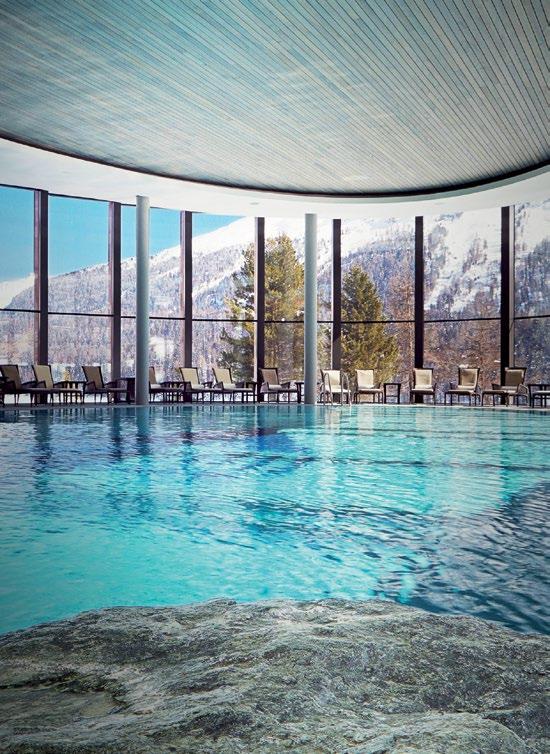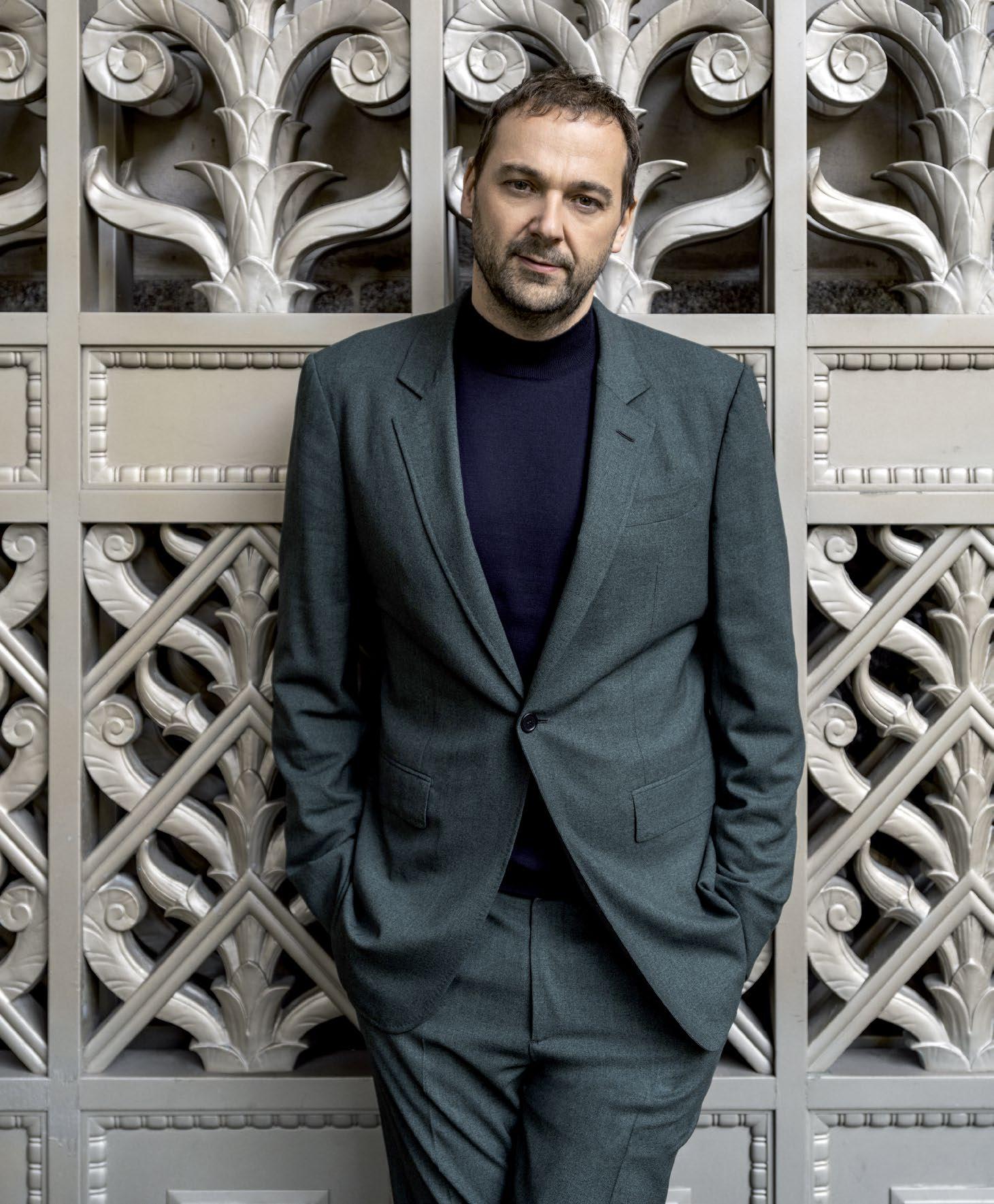
9 minute read
COVER STORY
134
112 HAUTE JOAILLERIE
Haute holiday joaillerie
134 HAUTE TRAVEL
Warm and cold weather destinations for the ultimate winter vacation
140 HAUTE BEAUTY
Redefining the plastic surgery experience with
Dr. Jose Rodríguez-Feliz, and all the details on Chloe
Long’s skin care line, Emerald
Ray Botanicals
30
HAUTE TIME
140
HAUTE BEAUTY

172 HAUTE CUISINE
New and noteworthy restaurants in Manhattan

174 HAUTE SCENE
The hottest Haute Living events of the season
178 HAUTE PARTNERS
Attorney Paul Samakow shares how to stay warm, but keep safe


REWRITING THE RULES
IT WASN’T ENOUGH FOR DANIEL HUMM TO BE A 3-MICHELIN-STARRED CHEF. HE WANTED TO DO IT ON HIS OWN TERMS — AND HE SUCCEEDED.
BY LAURA SCHREFFLER PHOTOGRAPHY SCOTT MCDERMOTT GROOMING CHICHI SAITO SHOT ON LOCATION AT ELEVEN MADISON PARK
— 11:11 an “angel number,” if you will — is an important number for many, and perhaps no one feels its seemingly mystical impact more keenly than Daniel Humm. Not only has his Flatiron District restaurant, Eleven Madison Park, earned 3 Michelin stars for the past 11 years — the first time actually being in 2011 — but precisely 11 years later, it sailed into uncharted territory by becoming the only vegan restaurant in the world to receive the Michelin Guide’s highest honor.
“Eleven is definitely my number. For me, it’s a reminder that there’s a new door to always open, no matter how impossible it might seem,” the 45-year-old Swiss-born chef announces.
That door officially opened three weeks prior to our October Zoom chat, and for all intents and purposes, Humm is still reeling from receiving this previously unthinkable accolade.
“I never thought we would get three stars — never in a million years. I thought it was impossible. But then I started thinking about the number 11, and how we received our first 3 Michelin stars 11 years ago. I definitely paused and was like, Well, wouldn’t that be something.”
It’s “something” alright — something that the highly decorated Humm declares to be the greatest achievement of his career. That’s a big statement for a man who received his first Michelin star at age 24, and another 14 times since. (He received his first star for Eleven Madison Park in 2010, then purchased the restaurant from restaurateur Danny Meyer’s Union Square Hospitality Group the following year.)
“To create something that no one else has ever done before is incredible, and I don’t know when I’ll have another opportunity like this again,” he admits, noting that “having that excitement after all these years is the most incredible part of all. The energy and motivation here is electric.”
As it happens, his decision to transform Eleven Madison Park’s menu into a meat-free domain was the best he could have possibly made, for a plethora of reasons. First and foremost, in creating something new, he got his joy of cooking back. Prior to deciding to go vegan, he had been suffering from success fatigue — professional burnout. Essentially, Humm was bored.
“Honestly, when I was at the height of — if you want to say my ‘critical acclaim’ — number one in the world, there wasn’t an award I didn’t receive. But actually, I didn’t feel all that happy because I was being pulled in so many different directions. Everyone wanted me to open restaurants in different places. So many things pulled me away from the work that I really wanted to do that, when the pandemic hit, [my world] became just about cooking again. I became aware that my language is food, that this language can speak loudly, that it’s a meaningful language.”
He wanted to use this love language to do something more, and with New York restaurants completely shuttered in 2020, in collaboration with Rethink Food (a nonprofit aimed at creating a more equitable, sustainable food system), he transformed Eleven Madison Park into an extremely elevated commissary, making sure the restaurant’s essential purpose — to feed — remained intact. “I decided to go down this path after the pandemic. We fed — and are still feeding — people in need. In cooking for people that are food insecure, I reconnected with food in a whole new way, [and] after it became clear that Eleven Madison Park would reopen, I made a commitment to myself that I would use this language for good, and that things would have to change. Our food system is broken, and so professionally, I felt obligated to speak up. But [I also wanted to] create the future, to use my energy to bring magic to plant-based dining, to make it beautiful and exciting, and so I made a conscious decision [to change things up],” he says. (The title of his fourth cookbook, Eleven Madison Park: The Next Chapter, though released in 2019, was especially indicative of this shift.)
And though for Humm it felt like a necessary evolution, it was also an incredibly bold move that sent distress signals around the world. Up until 2021, his establishment was known to highlight the crème de la crème of “luxury” ingredients, offering guests far and wide a seasonal, 8- to 10-course tasting menu that drew inspiration from local culture and history. Foods such as caviar, lobster, and Kobe beef were — literally and metaphorically — always on the table at the restaurant, which had not only appeared on the World’s 50 Best Restaurants list nine times but was also a six-time James Beard honoree. In fact, in 2017, Eleven Madison Park had the singular distinction of being named the best restaurant in the world. That Humm would mess with this kind of perfection was mind-boggling to many; his worldwide acolytes were truly baffled by his decision.
And so, the chef found himself making headlines, and not in a good way. “There was a lot of controversy. When we made the announcement, there were many who thought it was a PR stunt. They’d say, ‘Veganism is ruining Daniel Humm,’’’ he says, his honeyed (yet sniffly) tone conveying exactly what he thought of this particular headline. Yet, he admits, “It’s hard to be criticized. People are scared of change, but I think when you do something that’s truly in your heart, in a way, there is only winning.”
What was in his heart was a desire to do something different. Although he was constantly changing up the menu at Eleven Madison Park (and constantly receiving reassurance that this rotating system was superb), he felt stifled by it — creatively stagnant. “The idea of being best chef in the world made me feel kind of empty,” he divulges. “That’s such a silly thing anyway because there are so many great chefs, but it also didn’t feel like that the work that we were doing mattered enough to deserve such an accolade. I believe that when you’re at the height of critical acclaim, it’s not necessarily a time when you’re actually doing your best work. I had been cooking for 25


years, and all of a sudden it seemed like, that in those two years prior to becoming the best, everyone was suddenly telling me how great I was. It’s a funny thing to get so much attention. But for me, it didn’t quite connect to the importance of the work.”
Additionally, he felt it disingenuous to consistently work with such expensive foods, especially because he no longer enjoyed them. “To have yet another version of a caviar dish, or foie gras topped with black truffles, is boring. All of these things, they aren’t really even luxurious anymore; they’re old ideas. They might be expensive, but it’s not like they’re rare. It’s not like they even taste that good. To me, the most luxurious ingredient is time, and if I can have a unique experience — one that is only available in one place — to me, that is also a luxury,” he notes.
What’s important, he says, is the kind of praise he’s receiving now (which is on a slightly larger scale than his all-time favorite compliment: having artist Paul McCarthy compare his cuisine to a Robert Ryman painting). Humm pauses for a moment to read some powerful praise from Gwendal Poullennec, the international director of the Michelin Guides: “‘Quite simply, Chef Daniel Humm’s team at Eleven Madison Park has set the standard for plant-based dining. Becoming the world’s first vegan restaurant to earn 3 Michelin stars is a landmark achievement. It encourages young chefs to take bold steps in creating innovative dining experiences that please the palate, emphasize the importance of sustainability, and inspire change within the culinary landscape. Eleven Madison Park is the North Star they can fix their eyes upon as they navigate their gastronomic journey.’”
He pauses and blinks. “That’s just so … big. ‘The North Star.’ It’s a historical moment in dining. Michelin has really written the rules, set the precedent for what fine dining is. And with these stars, it’s their way of acknowledging the future.” And for Daniel Humm, this is only the beginning.
umm, who is recovering at the time of our chat after being sick, has just finished telling me his superhero origin story, and it goes like this: Although he was exposed to cooking at a young age and began working in kitchens as early as age 14 in his native Strengelbach, Switzerland, his real dream was to be a professional cyclist. But when he was 24, he was involved in a terrible accident that left him in a coma. When he woke up, he had some tough decisions to make about the path his life would take.
“I thought about my future, and I knew that I didn’t want to continue with the sport of cycling, and I thought, I should be a chef. And I want to be the best chef, because I was an athlete, and the only way an athlete measures is by competing,” he explains.
And for the next 20 years, he set out on a continuous quest for greatness, revealing that he didn’t truly pause to consider the path he was on until Eleven Madison Park was named best restaurant in the world. “[At that time] I started to be like, Oh wow, the view up here isn’t actually as great as I thought it was. I started to question things. And then the pandemic came, and it gave me an opportunity to take a step back and to rethink. You know, I’m young — I’m 45 years old — and I have many years ahead of me. I knew that I didn’t want to go back to this old way, and I knew that I wanted to create a different path forward.”
He’s doing that now by exploring different cultures, picking up global techniques from India and Japan, among other countries that have a heavy focus on vegetarian and vegan cuisine. He even hosted a Japanese monk in New York for over a month to learn from him.





